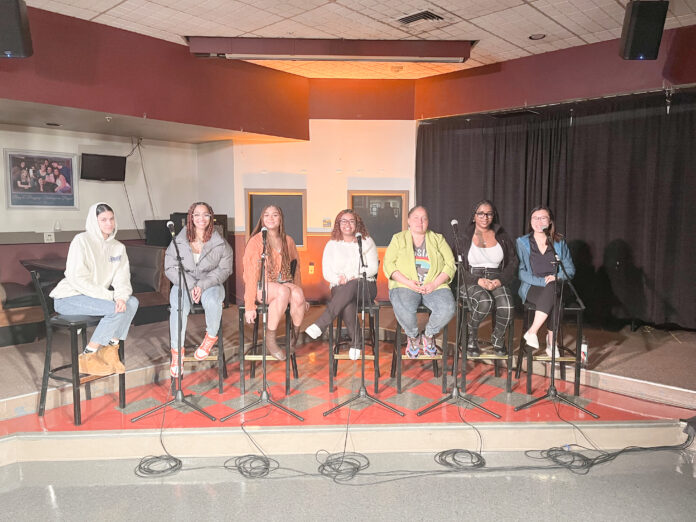
As their first panel in recognition of March as International Women’s Month, Muhlenberg’s women’s and gender studies program hosted a discussion “highlighting practical steps women of color and their allies can take in order to cultivate leadership styles that promote inclusion and social justice,” as was advertised on the flyer promoting the event.
Robin Riley-Casey, director of the Office of Multicultural Life and associate dean of students and diversity initiatives, began the event by addressing that she and Kate Richmond, Ph.D., professor of psychology and director of women’s & gender studies, felt “ashamed” by the initial, unintentional exclusion of Asian and Asian-American women from the panel that was advertised as being comprised of and arranged for women of color. This was first brought to their attention roughly 24 hours before the event, through an email from Irene Chien, Ph.D., assistant professor of media & communication, who had heard these concerns from her students. “This mirrors how often this happens in the real world,” said Richmond. On behalf of her students, Chien stated that “this exclusion reinforces to the campus community the historic exclusion of these students as people of color.” Riley-Casey closed the beginning remarks by acknowledging that this oversight is calling her to rethink the ways she engages with campus communities, emphasizing that, “This is an ongoing exercise and conversation.”
Moderated by Gabby Morales ‘23, the panel consisted of Allentown City Councilperson Ce-Ce Gerlach, as well as five Muhlenberg students—Richeta Cubano ‘24, AnnaMaria Fernandez ‘24, Shanae Fenton ‘24, Nevaeh Everett ‘25 and Regina Lau ‘23. The participants began by discussing the skills and values that are necessary for being an effective community leader, and whether or not they are specific to women of color. The panelists discussed such values as empathy, collaboration and respect, and how they are related to the experiences of women of color.
“Get used to being uncomfortable and being okay with it. Those small moments lead to larger moments.”
Councilperson Ce-Ce Gerlach
Cubano remarked that “The idea of women of color having to be different or work harder is stereotypical. It’s engraved into our minds but not needed. We’re all the same.” Additionally, Fernandez stated that women of color are sometimes asked to act upon these values more explicitly. “Empathy is not unique to women of color, but we have to have empathy and learn to use it as a means of communicating way earlier than other women or people… As women of color, we’re forced to use empathy, whereas white people aren’t taught that.”
Morales proceeded to ask the panel “what made [them] want to create and participate in leading community organizing.” Fernandez answered, “Frankly, I was tired of being silenced. I noticed I had to do it for myself or no one else was gonna do it for me.” Many speakers built upon the importance of the community in leadership, echoing Fernandez’s comment that even as the one to take charge, change often requires collaboration. Lau and Everett also referenced their involvement in Muhlenberg’s Emerging Leaders program. As a predominantly white institution (PWI), multiple panelists agreed with Lau’s experience of the “culture shock” of Muhlenberg and the importance of finding a strong community, which for Everett was the Black Students Association (BSA). Cubano also discussed the long-term historical and future impact of her community work, saying “I picked up the baton from the person before me, and when I leave, I pass it on to the next person.” Fenton also stated that she wanted to “[create] a space for other people to feel seen and represented.”
One of the more vulnerable moments of the talk was prompted by the questioning of the obstacles or challenges the panelists faced as women of color in leadership. Councilperson Gerlach began, stating “The Lehigh Valley is racist as hell. It is racist, classist, homophobic, etc… No matter how many degrees or qualifications you have, you will never be good enough. Most of the people calling the shots around here are white men, so when you walk into that room, they don’t want you there.”
Fernandez commented that she often feels her contributions become invisible in leadership. Even as the president of her sorority, which she acknowledged is a “very white national organization,” Fernandez continued, “[Muhlenberg] is the first to plaster my face everywhere and the first to silence me.”
“The school liked to nitpick what they want from you, but don’t want to give you anything,” said Everett in agreement. Lau also brought up the difficulty of addressing problems with Diversity, Equity and Inclusion (DEI), and Cubano expanded this idea by stating that students are unable to reach people in power to make a change. Fernandez touched on this later in the event, stating that “DEI work is most of the time for white people. There are no initiatives for change, just buzz words… Without anti-racist practices, DEI work is tokenism.” Everett continued, discussing the stigma of leadership and “holding it together” with the statement “As women of color, we can’t cry or express emotions. I always feel like I have to be okay to proceed with what I want to change.”
“As women of color, we can’t cry or express emotions. I always feel like I have to be okay to proceed with what I want to change.”
Nevaeh Everett ‘25
Most panelists agreed that one of the most important things that motivate them is their community and the idea that they are stronger when they come together. The group also added that there needs to be intention behind these collaborations and that being intentionally inclusive rather than simply creating spaces for people goes much further.
Gerlach concluded with her piece of advice for anyone wanting to become a leader: “Get used to being uncomfortable and being okay with it. Those small moments lead to larger moments.” The panel encouraged everyone to be leaders and make a change, as well as take care of themselves, with Fenton concluding “In order to be the change you want to see in the world, you also have to just be.”
Harry Glicklin '26 is a media & communication and English double major who is absolutely jazzed to be both a Copy Editor and a writer for The Muhlenberg Weekly. Outside of ~the office~, Harry is a member of the Muhlenberg AcaFellas, Hillel and the WMUH Allentown radio station.






















